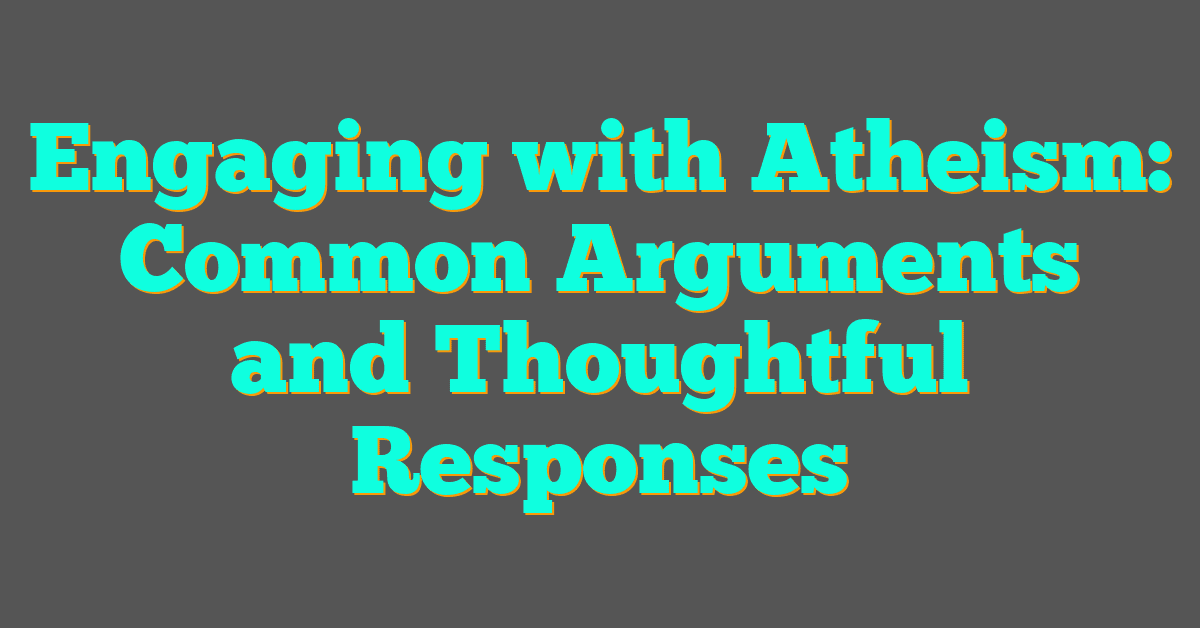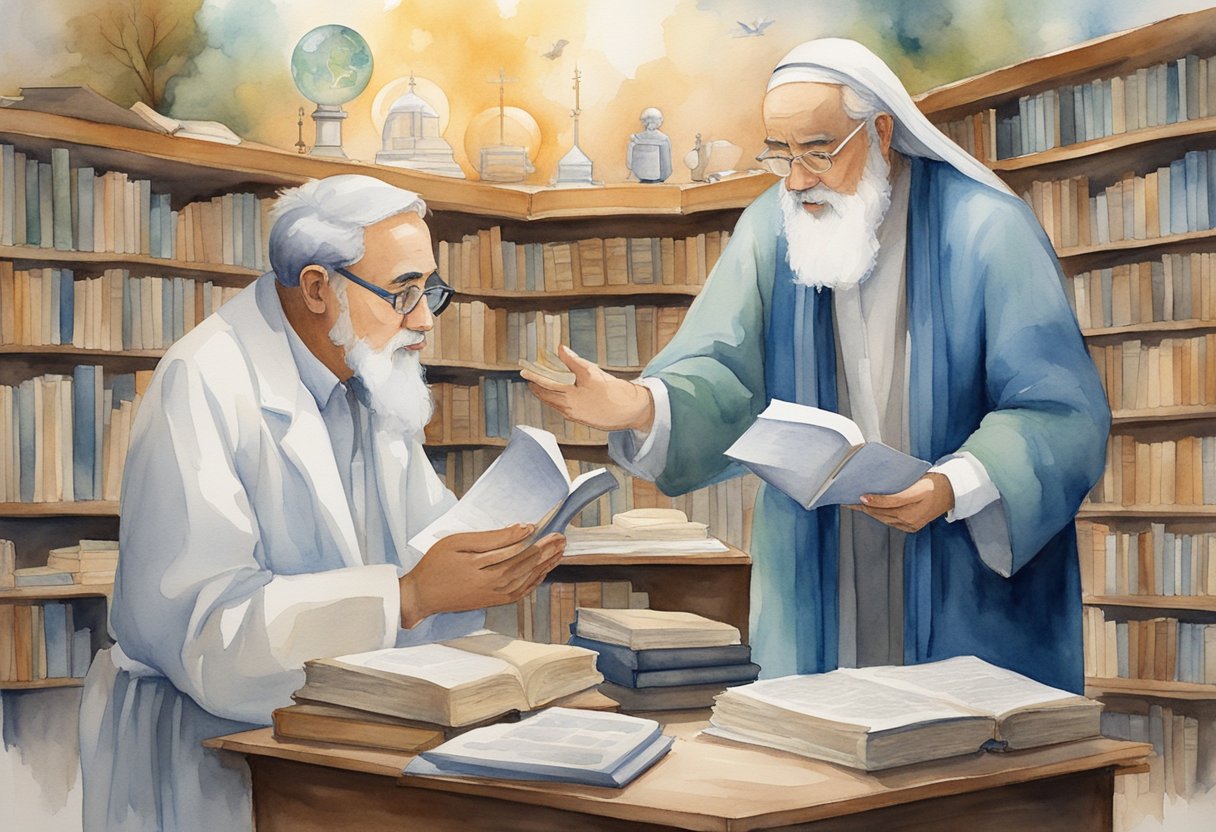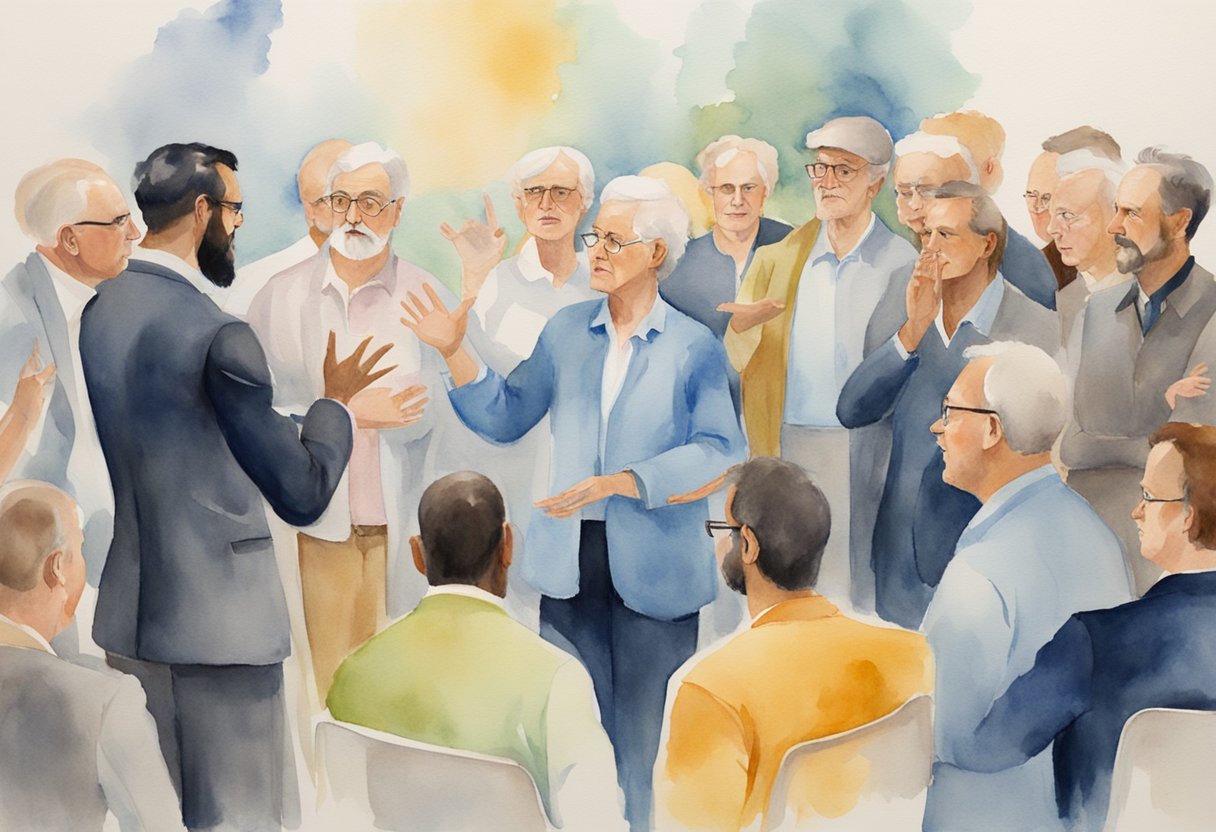Many people encounter discussions about atheism and theism in various aspects of life. Engaging in these conversations can seem daunting, especially when the topics of belief and evidence arise. Understanding the common arguments for and against atheism can pave the way for more meaningful discussions.


By exploring these arguments and the responses to them, individuals can better navigate their beliefs and the beliefs of others. This article delves into the key points often raised in debates about atheism and provides clear answers to foster respectful dialogue.
Readers will find that knowing how to engage thoughtfully with differing perspectives can contribute positively to their understanding of faith and reason.
Key Takeaways
- Atheism and theism involve engaging with deep beliefs and evidence.
- Discussions can enhance understanding of ethics and morality.
- Respectful dialogue promotes better conversations about faith and reason.
Understanding Atheism and Theism

Atheism and theism represent two different perspectives concerning belief in deities. Each viewpoint shapes individual beliefs, values, and worldviews. Understanding their definitions and historical context helps in engaging in meaningful discussions about faith and existence.
Definitions of Atheism and Theism
Atheism is the lack of belief in any gods or deities. Atheists often seek evidence for claims and do not accept religious beliefs without substantial proof. This perspective emphasizes a secular understanding of the world, relying on science and reason.
Theism, on the other hand, is the belief in one or more gods. Theists may follow organized religions or hold personal beliefs in a divine being. This view often provides a moral framework and a sense of purpose. Theists can include various denominations, such as Christians, Muslims, and Jews, each with unique beliefs regarding their deity.
History and Development
The concepts of atheism and theism have existed for thousands of years. In ancient civilizations, many people believed in multiple gods, as seen in Greek and Roman mythology. These early beliefs were often linked to natural events and human experiences.
Over time, philosophical debates arose. Figures like Epicurus and later Enlightenment thinkers questioned the existence of gods. The term “atheism” became prominent during the Renaissance and the Age of Enlightenment. As societies evolved, increasing scientific knowledge led many to challenge traditional religious views.
Throughout history, both atheism and theism have shaped cultures and societies. They interact in ways that reflect human thought and the quest for understanding, adapting across eras and contexts.
Exploring Beliefs and Evidence
In discussions about faith and atheism, beliefs and evidence play crucial roles. Understanding how each side views evidence can help clarify their viewpoints and foster respectful dialogue.
The Role of Evidence in Belief Formation
Evidence is foundational to belief formation for many individuals. Different people weigh evidence based on their experiences, upbringing, and culture. For some, tangible evidence, like scientific findings, holds more weight than personal experiences or spiritual revelations.

When forming beliefs about the existence of God, some rely on philosophical arguments, such as the cosmological or teleological proofs, which suggest a creator based on the existence of the universe or its complex design.
Others might seek emotional or personal experiences as evidence. These varied approaches highlight that belief systems often intertwine logic with personal values.
Common Atheist Arguments Regarding Evidence
Atheists often present key arguments focusing on the lack of empirical evidence for God. One common point is the problem of evil, which questions how a benevolent deity could allow suffering. Many argue that the existence of evil contradicts belief in an all-powerful, loving God.
Another argument is that of divine hiddenness, which suggests that if God exists, they should make their presence clear. This idea posits that widespread disbelief indicates a lack of sufficient evidence for God’s existence.
Additionally, atheists frequently cite scientific progress as a means to explain phenomena once attributed to divine action. They claim that natural explanations, such as evolution, account for life’s complexity better than theistic beliefs.
Theist Responses to Atheist Arguments
Theists often respond to atheistic claims with counterarguments rooted in philosophy and personal faith. In addressing the problem of evil, they might invoke the concept of free will. This argument suggests that a loving God grants humans the freedom to choose, which can lead to suffering but also to genuine love and goodness.
To counter divine hiddenness, some theists argue that God allows for faith without direct evidence to encourage personal growth. This view holds that faith can be a valuable part of the human experience.
In discussions about science, many theists embrace scientific discoveries as a way to better understand God’s creation. They argue that science and faith can coexist, offering a richer understanding of existence.
Religion, Science, and Knowledge

This section explores the roles of science and religion in shaping human understanding and knowledge. It looks at how science provides tools for uncovering truths about the natural world and how religion offers insights into moral and existential questions.
Science as a Tool for Understanding Reality

Science is often regarded as a powerful tool for understanding the world. Through observation and experimentation, it allows individuals to gather facts and draw conclusions.
Methods in science include hypothesis formation, testing, and peer review. These methods help ensure accuracy and reliability in findings. Fields like biology and physics explore topics such as evolution and the laws of nature.
While science excels in explaining “how” things work, it may not address deeper “why” questions. For some, this is where faith and religion come into play.
Religion and Its Claims to Truth
Religion, particularly Christianity, makes specific claims about the nature of truth and existence. It offers a framework for understanding morality, purpose, and the afterlife.
Many religious believers find strength and community through their faith. They see religion as providing absolute truths that guide their lives.

Critics often argue that these claims are not scientifically verifiable. This leads to a tension between scientific inquiry and religious belief. The differing perspectives can create rich dialogue or heated debates.
Interplay Between Faith and Knowledge
Faith and knowledge can interact in meaningful ways. For many, faith serves as a lens through which they understand scientific knowledge.
For example, believers in evolution might see it as a part of God’s plan rather than a challenge to their faith.
Education in both science and religion can promote critical thinking. People can explore questions where science provides insights and religion explores deeper significance. This blend encourages a respectful dialogue between different viewpoints.
Ethical Considerations and Morality

Ethics is a key area of discussion when engaging with atheism. The source of morality often comes under scrutiny, and different perspectives provide insights into human nature and goodness. This section explores sources of morality in both theistic and atheistic viewpoints, as well as secular perspectives.
Sources of Morality in Atheism and Theism
In theism, morality is often derived from a belief in a higher power. Many believe that a god provides clear guidelines on what is right and wrong. Adherents follow religious texts or teachings that outline ethical behavior.
Atheists, on the other hand, may find morality through naturalistic means. They believe that human nature and social agreements shape moral values. For them, empathy, reason, and the impact of actions on people guide their understanding of right and wrong.
Theism and the Foundation of Ethics
Theistic ethics often rely on divine command theory. This view suggests that good and evil are dictated by what God commands. For believers, following these moral principles leads to a righteous life.
Many theists also argue that morality without God is subjective. They worry that without a divine standard, people may create their own standards, leading to moral chaos. This perspective relies on the belief that goodness is tied to a belief in the supernatural.
Secular Perspectives on Moral Values

Secular ethics focus on human well-being and societal needs. Atheists often emphasize the importance of human rights and the consequences of actions. They argue that moral values can arise from understanding human nature rather than from religious belief.
Atheists may also cite moral philosophies, such as utilitarianism, where the best action promotes the greatest happiness. This shows that ethical behavior does not necessitate belief in a deity. Instead, it can be based on shared values and experiences in a pluralistic society.
Spirituality, Contemplation, and the Meaning of Life

Many people explore spirituality and contemplation to find meaning in life and understand existence. This journey can differ greatly between atheistic and theistic perspectives. Each offers unique insights into wonder, faith, and the search for purpose.
Atheistic Views on Spirituality and Wonder
For many atheists, spirituality can exist without belief in a deity. They often find wonder in nature, art, and human connections. This form of spirituality emphasizes feelings of awe and beauty rather than traditional faith.

Atheists may engage in practices like mindfulness and meditation to explore their thoughts and feelings. These practices promote self-reflection and a deeper understanding of life. Through this, they may find purpose in their relationships and contributions to society.
Theistic Approaches to Contemplation and Purpose
Theistic views on contemplation often involve a connection to God or a higher power. Many believers find meaning through prayer, worship, and community. These practices foster a sense of belonging and purpose, guiding them through life’s challenges.
In this context, contemplation is not just personal reflection. It connects individuals to a greater purpose and is about seeking understanding of divine will. The belief in God allows for a personal relationship that can bring light during dark times.
Philosophical Inquiry Into Existence
Philosophical inquiry into existence raises questions that challenge both atheistic and theistic beliefs. Thinkers ponder fundamental issues like “What is the meaning of life?” and “Does God exist?”
This inquiry can lead to various philosophies. Some advocate for a search for personal meaning, while others examine universal truths. This exploration encourages individuals to consider their beliefs about existence and the broader universe.

Engaging with these ideas often promotes deeper contemplation and an appreciation for life’s complexities.
Social and Political Impacts

Atheism has become more visible and influential in modern society, especially in politics and social structures. Its presence prompts discussions about morality, ideology, and the role of religion. Understanding these impacts helps clarify how atheist beliefs interact with wider societal norms.
Religion’s Role in Politics and Society
Religion has historically influenced politics, shaping laws and social values. Many political groups base their ideologies on religious principles. For instance, Christianity, particularly its dominant branches like the Catholic Church, plays a significant role in political debates.
In contrast, atheism promotes a separation of church and state. Atheists argue for policies rooted in reason and evidence, not religious doctrine. This shift can lead to more secular governance and diverse moral frameworks, challenging traditional beliefs held by many.

This ideological clash can create tension, where atheists often confront moral arguments from religious groups. Movements like New Atheism push for clear distinctions between personal beliefs and public policy.
Atheism in the Context of Contemporary Ideologies
In recent years, atheism has started to align with various contemporary ideologies. Many atheists advocate for social justice, emphasizing equality and human rights. This aligns them with progressivism, which often critiques religious institutions for failing to support moral imperatives.
Atheism also interacts with capitalism and socialism. Discussions about economic structures often include considerations of ethics. Atheists may challenge the moral bases of capitalism tied to religious values, advocating for more equitable systems.
Moreover, the rise of social media allows atheists to connect and interchange ideas. This builds a community that influences public opinion on religion’s role in society and politics. As a result, atheism continues to reshape discussions around morality and governance in an increasingly secular world.
Encountering Challenges and Debates

Engaging with atheism often involves addressing deep questions about suffering, morality, and the quest for meaning. Different views can create lively debates and sometimes difficult discussions.
Reconciling Suffering and Belief in God
This topic challenges many believers. If God is good and powerful, why does suffering exist? This question often arises in debates about faith. Many theists, including Christians, argue that suffering can serve a purpose. It can lead to growth, strengthen faith, or allow for free will.
Nietzsche’s views add another layer, suggesting that traditional beliefs may not hold up against human experiences. J. L. Mackie also discusses the problem of evil, questioning if a benevolent God can exist with so much pain in the world.
Believers often give personal stories of faith amidst suffering, claiming that these experiences can deepen their trust in God.
Atheism, Theism, and the Quest for Meaning
Both atheists and theists seek meaning in their lives, but they approach it differently. Atheists may find meaning in human experiences, relationships, and achievements without a belief in God. They often argue that morality can exist independently of religious beliefs, crafted through social agreements and empathy.
On the other hand, theists find meaning through their faith. Christianity teaches that life has purpose rooted in a relationship with God and preparation for an afterlife. Each side presents compelling points. Theists may argue that without belief in God, there is a lack of ultimate morality or purpose.
The quest for meaning can lead to thoughtful discussions about faith, existence, and the nature of reality.
Dialogues on Faith and Reason
Discussions about faith often intersect with the quest for knowledge and evidence. Engaging with different perspectives can lead to richer understanding, whether it involves influential thinkers or conversations between believers and non-believers.
Influential Thinkers on Religion and Rationality
Many intellectual giants have explored the relationship between faith and reason. Philosophers like Thomas Aquinas emphasized the harmony between belief in God and rational thought. He argued that reason could lead one to understand faith better.
Others, such as David Hume, raised questions about miracles and evidence. He believed that a lack of concrete evidence weakened religious claims. His skepticism encourages critical thinking about the “miracle of theism,” helping individuals evaluate beliefs in a rational light.
Moreover, thinkers like Bertrand Russell and Friedrich Nietzsche challenged traditional views, advocating for secularism and skepticism. Their works have spurred debates that remain relevant today, shaping modern discourse on religion and morality.
Interfaith and Atheist-Theist Discussions
Engaging in dialogues between atheists and theists can be enlightening. These conversations often focus on the nature of belief and evidence. Atheists might argue for a lack of empirical evidence for God, emphasizing reason over faith.
Theists often respond by pointing to personal experiences and historical claims supporting their beliefs. They may refer to philosophical arguments for God’s existence, like the cosmological or teleological arguments.
Such discussions help both parties clarify their positions. They can lead to a deeper appreciation of differing viewpoints. Exploring faith and reason together fosters an environment where knowledge can grow, and mutual respect can flourish.
Concluding Thoughts
Engaging with atheism involves exploring deep questions about reality and truth. Many find joy in conversations that challenge their beliefs, fostering understanding between different views.
Love for friends can bridge gaps. When discussing beliefs, kindness and respect create a safe space for dialogue.
It’s important to listen as much as to speak.
People often worry about faith versus facts. Understanding that both can coexist can ease tensions.
Beliefs may differ, but the quest for truth is common to all.
Emphasizing shared values helps. Topics like morality and love can unite rather than divide.
A simple conversation can lead to powerful insights.
While some may not share faith, they often seek genuine connections. Finding common ground encourages harmony and can lead to lasting friendships.
Respectful dialogue enriches everyone. Engaging with atheism can be a journey full of discovery and shared insights. It reminds individuals that seeking truth is a fundamental part of the human experience.












